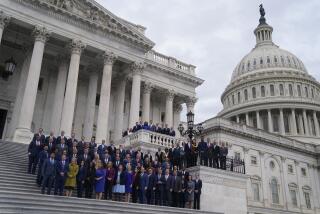Happy Birthday ... Now Grow Up
- Share via
Birth order invariably influences our standing in the family, and, along with our personalities as children, can cause us to be forever defined as, say, “the middle child” or “the smart one.” So it is with nations.
In the context of the family of nations, it is likely that the United States will always be viewed as a young country. Our buildings and landmarks, few more than two centuries old, include no royal palaces, and our institutions lack the weathered character created by repeated political and social change. Our contributions to art, literature and music, though distinct and honored, have not been tested over time.
Compared with elder nations, we are inexperienced in traditions and history. Most probably the popular view is that our immaturity holds us back from appreciating the wisdom that emerges from long-standing religious and political struggles, many wars in the homeland and centuries of cultural bursts and upheavals.
The paradox is that while we maintain the position of superpower, we do so as an adolescent--and more significantly, an adolescent with money. We display the confidence and arrogance of a 15-year-old boy. We know everything, we can do everything, we are entitled to everything and, naturally, we should be exempt from any and all consequences.
History shows that this headstrong, self-serving posturing sometimes jeopardizes our ability to maintain constant allegiances, especially when it is accompanied by aggressive actions (bombing Iraq and Afghanistan), dismissive actions (ignoring land mines and environmental issues raised by the United Nations) and irresponsible actions (selling arms to hostile countries for short-term political gains).
Unfortunately, since Sept. 11 our posturing and rhetoric, particularly related to “the axis of evil,” have energized a broader and more visible disdain from foreign leaders as well as their citizens.
Yet, for all the negative reviews, our nation continues to garner respect for those characteristically adolescent qualities that have helped us prevail as a superpower. We aim high, dismissing obstacles, and we are ready to take on the world and change it. We are willing to take risks and often succeed. We are full of passion and dream big. Just like a teenager.
And in the same way that adults regard an arrogant and slightly rebellious teenager, the world views us with a mix of disdain and admiration. Other countries eye our materialism and freedom while they comment on our shallowness.
Often we are envied because we accumulate and are completely at ease with state-of-the-art technology; yet, we are also criticized for those attributes.
As we approach our nation’s 226th birthday, we are reminded of the origin and course of our history. Doubtless, we will be reminded of our patriotism, newly charged since Sept. 11. Our leaders will rally us to celebrate not only our own passage to independence and democracy but also our commitment and support for these principles in other countries. Once again, we will honor ourselves as “the greatest country in the world.”
So, happy birthday to the United States of America. We face a very different future than we did on our last birthday, and, according to tradition, it is time to reflect. Is it to our advantage to remain eternally adolescent, to face the challenges of terrorism and global relations with single-minded determination and resilience? Or is it time to inch into adulthood, cultivating wisdom and restraint?
*
Barbara Barnow is a writer in Columbia, Md.


